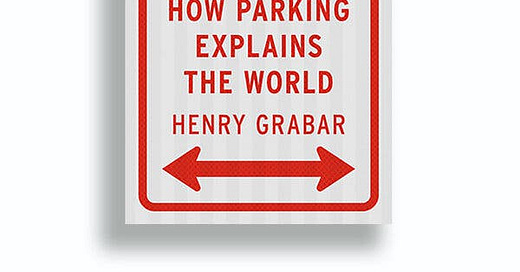Paved Paradise
"You think architects design buildings, but actually we just arrange parking spaces"
Many parts of the US can feel like parking lots with buildings attached. We really care about parking. We care so much, Henry Grabar argues in Paved Paradise, that we’ve arranged our world around it. Suburbs exist to accommodate it. Apartment buildings are designed around their parking lots. Many American houses have garages, ostensibly for our cars but often serving other purposes. And, Grabar believes, we’re doing it all wrong.
Paved Paradise: How Parking Explains the World by Henry Grabar
We’re all worried about having enough parking, which results in lots of parking being built: cities have minimum parking requirements for apartments and commercial buildings, and many businesses insist on having extra-large lots. For example, 10 additional Dodgers Stadiums would fit inside of the LA baseball team’s parking lot. 13% of the land in Silicon Valley is dedicated to parking lots.
This has a cost. It makes it more expensive to build anything, whether it’s a store or a baseball stadium. And housing, in particular, is much less affordable when a significant portion of a building's footprint must be allocated for parking spaces. And with apartments, we solve for cars and make the actual housing around it. We bend our lives to our cars, not the other way around. As one architect says:
You think architects design buildings, but actually we just arrange parking spaces. It’s the first thing you think about. The spaces determine the column grid, and the columns determine the building. We end up planning housing modules around this unit that works of parking but not for housing
The irony is that we don’t need as much parking as we think: Even before Covid, most parking lots were rarely filled beyond 60% capacity. Dense cities like Philadelphia or Seattle have 3 to 5 parking spots per household (with some cities at 20+!). And many garages attached to houses just fill up with clutter as we park in our driveways instead.
Don’t even get Grabar started on curb parking. As he puts it, it’s the cheapest real estate in the world: where else can you claim space in Manhattan for free? In many cities, curb spots are claimed by folks who arrive early and stay all day, which results in limited availability. If you get a really good spot, you might not move your car for days because you’re so afraid to lose it. So, people spend additional time and fuel circling to find parking spots, which takes up a lot of time and gas.
My reactions and thoughts
I hadn’t really thought about parking before reading this, but he raises some good points. I especially found it interesting to read about the tension between housing affordability / supply and parking minimums.
This is a vicious circle: the more parking you build, the more people drive, and the more parking you need. It reminded me of The Power Broker, in which NYC builder Robert Moses kept building bridges to alleviate congestion, but it simply results in more people driving and traffic getting worse. Sometimes “brute force” or simply adding more of something doesn’t fix the problem and makes it worse (see Recoding America, in which hiring additional government workers to process unemployment claims during covid actually slowed the process down, or The Afghanistan Papers, which discussed how the US tried to “fix” Afghanistan by spending lots of money, which simply led to lots of corruption and newly constructed schools sitting empty)
The book keeps coming back to curb parking and how it’s an underused part of any city. As he correctly says, people hate walking to their destination from a faraway parking spot and they especially hate parking in a garage and paying garage rates. Something like 9% of Manhattan is simply curb. Covid taught people that curbs could be valuable, whether for restaurant dining or simply to put trash bins on to make NYC more bearable during the summer
What makes parking so interesting it that it means so many different things to different people. A discussion about parking is about parking, but about values as well:
Property rights (who does it belong to? Can the government tell us what to do with it?)
Equality and economics (should it go to the highest bidder or whoever earns it by being there first? Does anyone have the right to sleep in their car in a parking lot if they have nowhere else to go?)
Laws and lawlessness (do people follow the rules? Or are they like NYC ice cream trucks, which rack of tens of thousands of $’s in parking fees each year)
Status and hierarchy (does the CEO get their own parking spot?)




